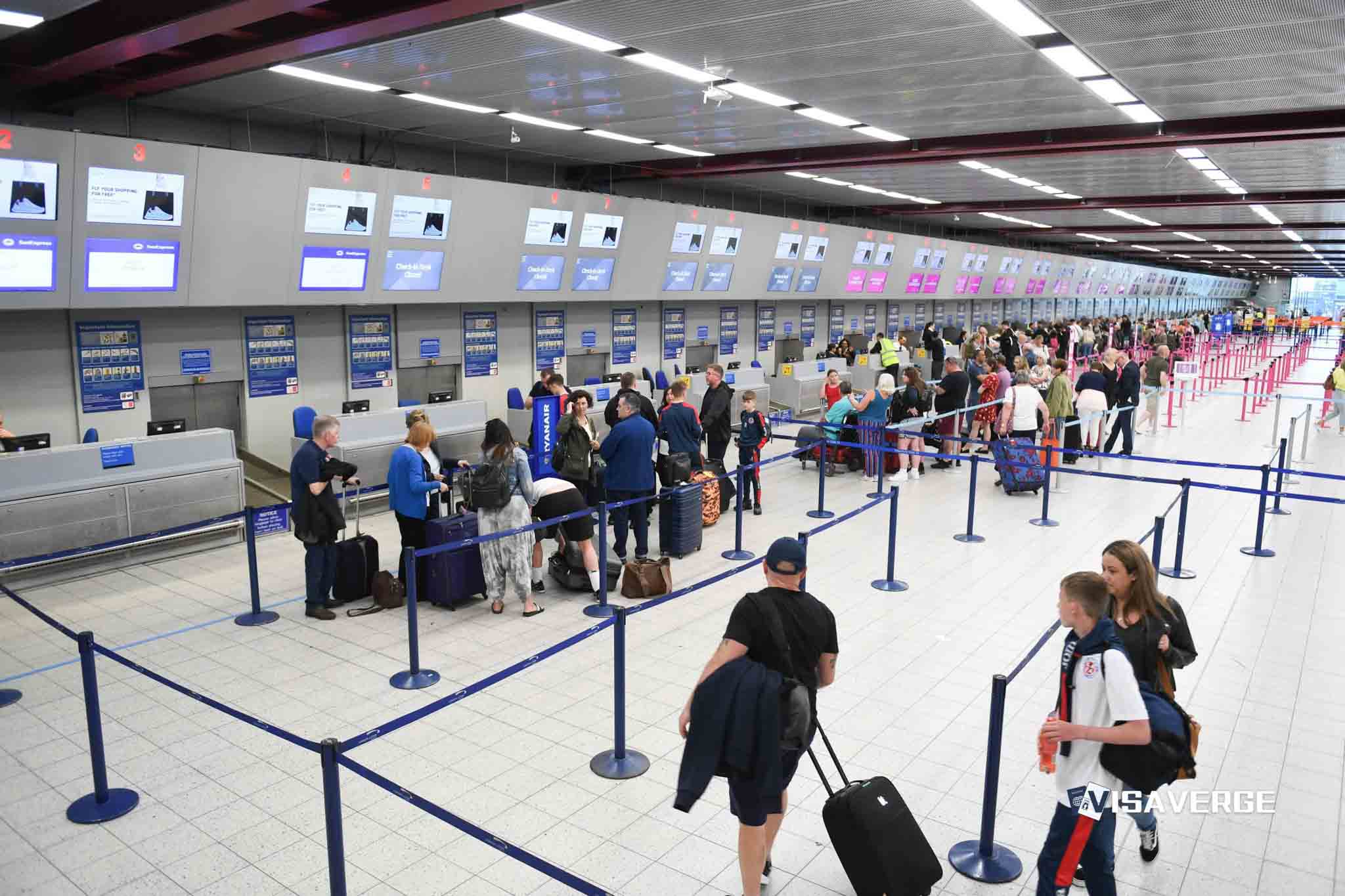Key Takeaways
• HHS banned undocumented immigrants from many federal health and social programs, effective July 10, 2025.
• Programs affected include Head Start, Community Health Centers, and mental health and substance use services.
• Emergency care still provided, but eligibility screenings and administrative rules changed immediately for providers.
On July 10, 2025, the U.S. Department of Health and Human Services (HHS) announced a major change that immediately bars undocumented immigrants from a wide range of federal health care benefits and social programs. This update marks a sharp reversal of more than 25 years of practice and has far-reaching effects on millions of people, including children and families across the United States 🇺🇸. Here’s a clear summary of what changed, who is affected, what actions are required, and what this means for pending and future applications.
What Changed: The New HHS Policy

HHS has officially rescinded a 1998 interpretation of the Personal Responsibility and Work Opportunity Reconciliation Act of 1996 (PRWORA). For over two decades, this interpretation allowed some undocumented immigrants to access certain federal health and social programs. The new policy, published in the Federal Register on July 10, 2025, now strictly enforces the original intent of PRWORA by classifying more programs as “Federal public benefits” and making undocumented immigrants ineligible for them.
Effective Date and Public Comment Period
- The policy took effect immediately on July 10, 2025.
- There is a 30-day public comment period starting from the date of publication. However, HHS made it clear that the policy is already in force due to what it calls an “ongoing emergency at the Southern Border of the United States 🇺🇸.”
- Anyone wishing to submit comments or feedback can do so through the official HHS website.
Who Is Affected
This policy affects undocumented immigrants—people living in the United States 🇺🇸 without legal immigration status. It also impacts:
- Children in mixed-status families (families where some members are U.S. citizens and others are undocumented)
- Individuals with certain temporary legal statuses who may now face more scrutiny
- Health care providers, clinics, and social service organizations that serve immigrant communities
HHS estimates that tens of millions of people could be affected each year by these changes.
Programs Now Restricted
Undocumented immigrants are now barred from accessing the following federal programs, which are newly and explicitly classified as “Federal public benefits” under PRWORA:
- Head Start (early childhood education and health assistance)
- Community Health Center Program
- Certified Community Behavioral Health Clinics
- Community Mental Health Services Block Grant
- Community Services Block Grant
- Health Workforce Programs (including grants, loans, scholarships, payments, and loan repayments)
- Mental Health and Substance Use Disorder Treatment, Prevention, and Recovery Support Services Programs (administered by the Substance Abuse and Mental Health Services Administration)
- Projects for Assistance in Transition from Homelessness Grant Program
- Substance Use Prevention, Treatment, and Recovery Services Block Grant
- Title IV-E Educational and Training Voucher Program
- Title IV-E Kinship Guardianship Assistance Program
- Title IV-E Prevention Services Program
- Title X Family Planning Program
Summary Table: Key Programs Newly Restricted
| Program Name | Newly Restricted? | Notes |
|---|---|---|
| Head Start | Yes | Estimated $374M redirected to citizens annually |
| Community Health Center Program | Yes | Over 15,000 clinics affected |
| Certified Community Behavioral Health Clinics | Yes | |
| Community Mental Health Services Block Grant | Yes | |
| Community Services Block Grant | Yes | |
| Health Workforce Programs | Yes | Includes grants, loans, scholarships, payments, loan repayments |
| Mental Health/Substance Use Disorder Programs (SAMHSA) | Yes | |
| Projects for Assistance in Transition from Homelessness | Yes | |
| Substance Use Prevention, Treatment, Recovery Block Grant | Yes | |
| Title IV-E Educational and Training Voucher Program | Yes | |
| Title IV-E Kinship Guardianship Assistance Program | Yes | |
| Title IV-E Prevention Services Program | Yes | |
| Title X Family Planning Program | Yes |
Immediate Actions Required
If you are an undocumented immigrant or work with immigrant communities, here are the steps you need to take right now:
- Check your eligibility: If you are currently receiving services from any of the programs listed above, contact your provider to ask about your continued eligibility.
- Prepare for possible changes: Clinics and service providers are now required to update their eligibility screening and administrative procedures. This means you may be asked for proof of citizenship or legal status before receiving services.
- Submit comments or concerns: If you want to share your thoughts about the new policy, you can submit comments during the 30-day public comment period through the HHS Press Room.
- Seek local or state resources: Some states, like California 🇺🇸, New York 🇺🇸, and Illinois 🇺🇸, may continue to offer certain benefits to undocumented immigrants using their own funds. Check with local agencies for more information.
Implications for Pending Applications
- Applications already in process: If you have a pending application for any of the affected programs, your eligibility will now be reviewed under the new rules. This means you may be denied benefits if you cannot prove legal status.
- No “grandfathering”: There is no indication that people already receiving benefits will be allowed to keep them if they do not meet the new requirements.
- Providers must comply: Health centers, clinics, and social service agencies must update their procedures right away, even while the public comment period is open.
Key Statements from HHS Officials
- HHS Secretary Robert F. Kennedy Jr. stated, “For too long, the government has diverted hardworking Americans’ tax dollars to incentivize illegal immigration. Today’s action changes that—it restores integrity to federal social programs, enforces the rule of law, and protects vital resources for the American people.”
- Acting Assistant Secretary Andrew Gradison (Administration for Children and Families) said the new policy “puts American families first by ensuring taxpayer-funded benefits are reserved for eligible individuals.”
Practical Effects on Communities and Providers
- Head Start: HHS estimates that up to $374 million in additional Head Start services could now go to American citizens each year.
- Community Health Centers: Over 15,000 clinics across the country may have to turn away undocumented patients or stop receiving federal payments for treating them.
- Mental Health, Substance Use, and Homelessness Programs: Access to these services is now restricted for undocumented immigrants, which could lead to higher rates of untreated mental illness and substance use in these communities.
- Emergency Care: Federal law (EMTALA) still requires hospitals to treat anyone with a medical emergency, no matter their immigration status. This is one of the few exceptions to the new rules.
Administrative and Financial Impact
- Transition costs: HHS estimates that updating eligibility screening and administrative procedures could cost up to $175 million for affected programs.
- Communicable disease treatment: There may be exceptions for treatment of diseases that can spread to others, but the details are still unclear and will depend on further guidance from HHS.
Expert and Advocacy Group Responses
- Stan Dorn, UnidosUS: Called the measure “cruel and extreme,” warning it will worsen health outcomes and increase fear among immigrant communities.
- Tanya Broder, National Immigration Law Center: Noted that some clinics may try to classify services as related to communicable diseases to keep providing care to undocumented immigrants.
- Clare Coleman, National Family Planning & Reproductive Health Association: Warned that the policy “threatens public health and fosters discrimination against immigrant communities and others who can’t prove citizenship.”
Historical and Legal Background
- The Personal Responsibility and Work Opportunity Reconciliation Act of 1996 (PRWORA) was designed to restrict most federal public benefits for noncitizens, including undocumented immigrants. However, a 1998 HHS interpretation allowed broader access to some programs.
- The 2025 policy shift is described by HHS as a return to the original intent of PRWORA.
Potential Legal and Political Challenges
- Legal challenges expected: Advocacy groups, health care providers, and some state governments are likely to challenge the new policy in court.
- State-level responses: States like California 🇺🇸, New York 🇺🇸, and Illinois 🇺🇸 may continue to offer some benefits to undocumented immigrants using their own funds.
- Possible changes ahead: Because the policy is open for public comment and legal review, further changes or clarifications may come in the next few months.
What This Means for Immigrants and Their Families
- Loss of access: Many undocumented immigrants will lose access to important health, education, and social services.
- Increased fear and confusion: Immigrant communities may feel more afraid to seek help, even for services they are still eligible for.
- Public health risks: Experts warn that restricting access to care could lead to more untreated illnesses, which could affect the wider community.
- Uncompensated care costs: Hospitals and clinics may face higher costs for treating uninsured patients who can no longer get federal help.
What Providers and Advocates Should Do
- Update procedures: All affected programs must review and update their eligibility screening right away.
- Train staff: Make sure staff understand the new rules and know how to ask for proof of legal status.
- Communicate with clients: Let current and potential clients know about the changes and what documents they may need.
- Monitor for updates: Watch for new guidance from HHS, especially about exceptions for communicable diseases and other urgent care.
Exceptions and Special Cases
- Emergency medical care: Hospitals must still provide emergency treatment to anyone, regardless of immigration status, under the Emergency Medical Treatment and Labor Act (EMTALA).
- Communicable diseases: Some treatment for diseases that can spread to others may still be allowed, but the details are not yet clear.
- State and local programs: Some states may continue to offer certain services to undocumented immigrants using their own funds.
How to Stay Informed and Take Action
- Visit the official HHS website for the latest updates, official statements, and to submit comments or questions about the policy.
- Follow HHS on social media for real-time updates: Facebook and X (@HHSgov, @SecKennedy).
- Contact local service providers to ask about your eligibility for specific programs.
- Prepare documentation: If you are eligible for services, make sure you have the documents you need to prove your status.
Looking Ahead: What to Expect
- Legal battles: The policy is likely to be challenged in court, which could delay or change how it is enforced.
- Possible changes: The 30-day public comment period means HHS could make adjustments based on feedback.
- State-level support: Some states may step in to fill gaps left by the loss of federal benefits.
Summary of Key Points
- HHS has banned undocumented immigrants from a wide range of federal health care benefits and social programs, effective July 10, 2025.
- The policy affects millions, including children and families, and requires immediate changes to eligibility screening by providers.
- Emergency care remains available to all, but most other federal benefits are now off-limits to undocumented immigrants.
- Legal challenges and state-level responses are expected, and further changes may come after the public comment period.
For More Information
- Visit the official HHS website for updates, official statements, and to submit comments.
- For analysis and ongoing coverage of immigration policy changes, VisaVerge.com reports that this HHS decision marks one of the most sweeping federal restrictions on undocumented immigrants’ access to health and social services in recent years.
Actionable Takeaways
- If you are an undocumented immigrant, check with your local provider or state agency to see what services are still available to you.
- If you work with affected communities, update your procedures and help clients understand the new requirements.
- Stay informed about possible legal changes and state-level programs that may offer help.
- Submit your comments or concerns to HHS during the 30-day public comment period if you wish to share your views.
This policy update represents a major shift in federal benefits for undocumented immigrants. Immediate action is needed by individuals, families, and service providers to adjust to the new rules and to seek out alternative resources where possible.
Learn Today
HHS → U.S. Department of Health and Human Services managing federal health programs and policies.
PRWORA → 1996 law restricting noncitizens’ access to most federal public benefits and services.
Federal public benefits → Programs funded by the federal government that provide health or social services.
EMTALA → Federal law requiring hospitals to provide emergency treatment regardless of immigration status.
Public comment period → Timeframe for the public to give feedback on government policies or rules.
This Article in a Nutshell
On July 10, 2025, HHS reversed decades of policy by restricting undocumented immigrants’ access to federal healthcare programs, sparking legal challenges and requiring providers to update eligibility checks immediately.
— By VisaVerge.com








